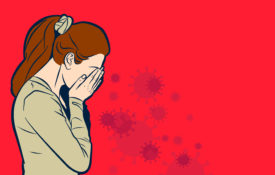-

Contracting COVID-19: Lifestyle and Social Connections May Play a Role
New research proposes lifestyle, social, and psychological factors may increase the risk of contracting COVID-19. [July 9, 2020]
-
‘It Can Be Hard to Concentrate or Focus on Something Else’
After George Floyd was killed by police officer Derek Chauvin in Minneapolis, as three other police officers looked on, images and videos circulated via news and social media. Weeks earlier, video of Ahmaud Arbery’s killing[content warning: the linked post contains descriptions of graphic violence]went public, prompting the long-overdue arrest of the two white men who killed him. On social media, Black people expressed frustration that it took this graphic, viral video — shared widely by white people — to get justice. Both deaths reignited debate over the dissemination of images and videos depicting dead Black people, and the trauma they inflict on Black people who see them.
-

New Research in Psychological Science
A sample of research on fake news, first impressions and romantic interest, prenatal environment and development, the development of social prototypes and stereotypes, and electronic-media use and sleep in childhood.
-
Jennifer Eberhardt – Armchair Expert
Podcast interview with APS Member Jennifer Eberhardt BONUS EPISODE with Jennifer Eberhardt (social psychologist who is currently a professor in the Department of Psychology at Stanford University) is the first in a monthly series on dissecting the Black experience in America. Jennifer chats with the Armchair Expert about her work in police reform, her personal experiences with racism and the biological impact of cultural biases. Dax asks if there are any model police departments and Jennifer shares a story of when she got arrested. She talks about having “the talk” with her sons and she shares the details of many psychological experiments she did on race and discrimination.
-
Masking America’s Fears: How Do We Get People to Take COVID-19 Seriously?
Podcast interview with APS Member Jay Van Bavel The “reopening” of America depends of slowing the spread of coronavirus, which in turns depends on Americans changing their behavior. Why do so many people refuse to take even small steps like wearing masks to stop the spread? NYU associate professor Jay Van Bavel joins CBSN’s Lana Zak to talk about the psychology of public health advice. … Watch full interview at the link below.
-
Across the U.S., Families are Having Tough Talks About Racism
One night in late May, Wendy Bohon and her mom were piecing a puzzle together at the dining room table when they heard from the living room a news anchor’s somber voice, prepping his audience for what they were about to see. Bohon knew the general details of George Floyd’s death in Minneapolis, the way his neck was pinned to the concrete by a white police officer for nearly nine minutes. But she hadn’t yet watched the video that would soon ignite a national uprising. And she didn’t know what her mom, a fifth-generation Virginian, might say about it. The mother and daughter got up from the table, stood behind Bohon’s dad in his rocking chair, and watched.

